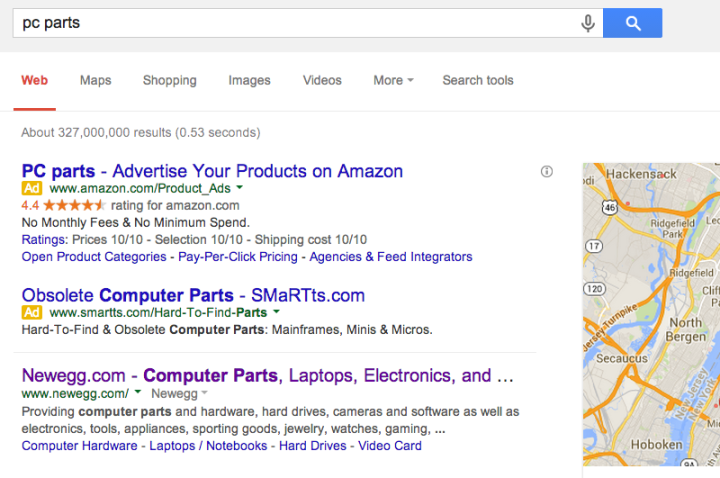
Google is always testing new tweaks to even their most successful products, but there’s one change to Google search rolling out to the public as we speak that may benefit the tech giant in the short term, but come back to bite them in the long run. The new layout changes the way Google presents paid search results, while also making it more difficult to differentiate between ad-supporting links and real search results.
To this point, Google search results were placed directly below paid URLs set against a yellow background. With the new layout, searches still yield the same set of paid ads, but instead of setting them apart with a colored background, paid ad links now feature a yellow “Ad” button next to each link. Similarly, when a search generates a sidebar of paid results, the links are distinguished with a single “Ads” button at the top of the list.
Whether this is intentional or not, Google has seemingly made it much easier for users to click on paid search results by mistake. Anyone who takes the time to read their results will clearly recognize which ads are paid and which are organic, but users scanning results quickly may not pick out the sponsored URLs as easily without their distinctive color-coating.
According to PCWorld, Google began publicly testing the paid search buttons late last year as part of larger refresh of their mobile layout, which also added a larger font and removed underlines for search results.
Even a relatively increase in paid clicks would generate a huge windfall for Google, but they may do so at the cost of their consumers’ trust if users feel they’re being tricked into engaging advertisers. Leo Dalakos, VP of Performance Media at digital marketing agency Perfomics, told PCWorld that he’s weary of how the change could affect Google’s reputation: “Does Google want to increase its click-through rates as much as possible? Yes.”
Whether this could come back to bite Google and result in a significant decrease in user trust and confidence remains to be seen.
Do you think people will have more trouble telling the difference between paid and organic search results when using Google? Let us know in the comments below.
Editors' Recommendations
- How to generate AI art right in Google Search
- Apple almost rejected Google for this key Safari feature
- Google’s ChatGPT rival just launched in search. Here’s how to try it
- This Bing flaw let hackers change search results and steal your files
- Oops — Google Bard AI demo is disproven by the first search result


